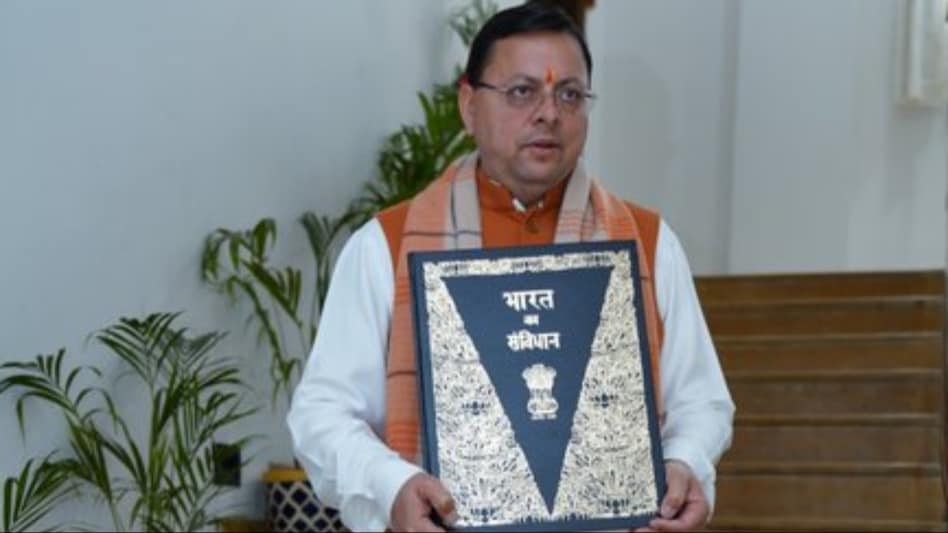Opposition asked for sufficient time to study Uniform Civil Code Bill in Uttarakhand
Dehradun. After independence, Uttarakhand has become the first state in the country to take a decisive initiative towards a Uniform Civil Code. After a long exercise, the government presented the Uniform Civil Code, Uttarakhand-2024 Bill in the Assembly on Tuesday.
The bill introduced in the House by Chief Minister Pushkar Singh Dhami has 392 sections, out of which the number of sections related to succession alone is 328. The protection of women’s rights has mainly been kept at the center of the bill. The Bill, totaling 192 pages, has been divided into four sections: Marriage and Divorce, Succession, Live-in Relationship and Miscellaneous.
After the bill is passed, it will be sent to Raj Bhavan and then to Rashtrapati Bhavan for approval. If this bill becomes law, the evils and bad practices prevalent in the society will come under the category of crime and will be banned. These include practices like polygamy, child marriage, divorce, Iddat, Halala. There will be no impact on anyone’s religious freedom upon implementation of the Code. The bill makes provisions for equal rights in property for women.
Leader of Opposition Yashpal Arya said that adequate time should be given to study the bill. Why is the government in a hurry on this? The Chief Minister presented the bill in the House amidst sloganeering. After the presentation of the bill, the Speaker of the Assembly adjourned the proceedings of the House till 2 pm, giving about two and a half hours time to the members to study it. Discussion on the bill started at 2 pm.
The entire Uttarakhand has been taken under the ambit of the bill presented to implement the Uniform Civil Code. If the law is made, it will also apply to those residents of Uttarakhand who are living outside the state. This law will also be applicable on those who reside in the state for at least one year or take benefits of state and central schemes. Scheduled Tribes and groups protected in Article 21 of the Constitution of India have been kept out of its scope.
The first section of the Bill focuses on marriage and divorce. It has been made clear that polygamy and child marriage will be invalid. At the time of marriage, the minimum age of the girl should be 18 years and the minimum age of the boy should be 21 years. Also, the parties to the marriage should not fall within the prohibited degrees of kinship. In this degree relations with immediate relatives are prohibited. If they are within these degrees, then the custom or custom of one of the parties permits marriage between them, but this custom or custom should not be contrary to public policy and morality.
Registration of marriage and divorce has been made mandatory in the Code. Registration of marriages taking place after March 26, 2010 will be mandatory. The marriage will remain valid even in case of non-registration, but penalty will be imposed for non-registration. The punishment will be imprisonment up to a maximum of three months and a fine of up to Rs 25,000.
Conjugal rights for all religions have also been mentioned in the bill. Also, arrangements have been made regarding judicial separation. It is also stated in which circumstances the marriage will be considered a void marriage. The bill highlights the issue of divorce in detail. No one will be able to divorce in any way other than the provisions mentioned in this Code. This system will stop the practice of unilateral arbitrary divorce.
Provisions have been made regarding maintenance and custody of children while the petition regarding divorce is pending. For violating the sections mentioned in the code, there has been a provision of imprisonment up to six months and a fine of Rs 50,000. In cases of divorce, there will be imprisonment of up to three years. If anyone violates the rules for remarriage, he will be liable to a fine of up to Rs 1 lakh and imprisonment of up to six months.
The second section of the Bill covers the subject of succession. The general rules and methods of succession are explained in the Bill. In this, women of all religions have been given equal rights in property. It has been made clear that all surviving children, sons or daughters will have equal rights in the property.
If a person does not make any will and does not have any children or wife, then relatives will be given priority for succession. For this also a list has been prescribed in the bill. The Bill makes extensive provisions regarding succession. A total of 328 sections have been kept in it.
For not registering for live-in, there is a provision of maximum imprisonment of three months and fine up to Rs 10,000. On the other hand, giving wrong information or not giving information even after giving notice can lead to imprisonment of maximum six months or fine of maximum Rs 25,000 or both. If a man leaves a female cohabitant, the female cohabitant can demand maintenance from him. The bill has authorized the state government to make separate rules for live-in.











